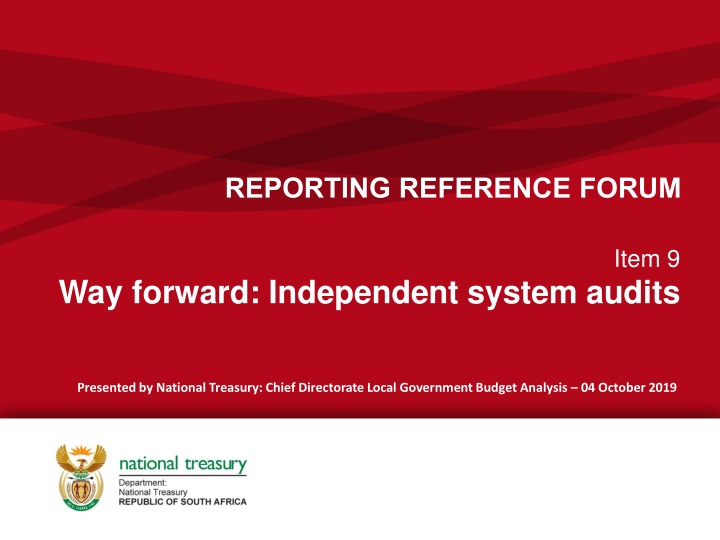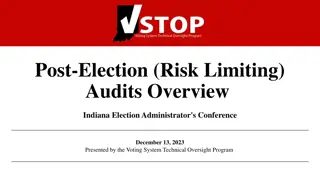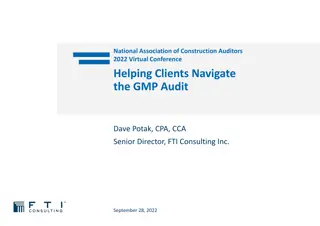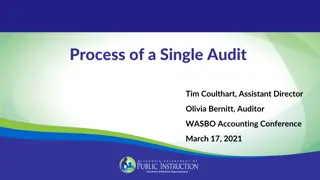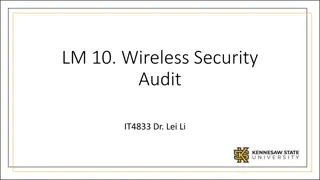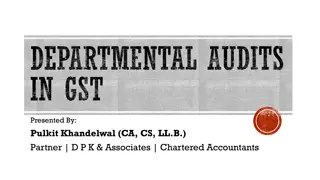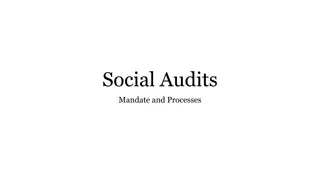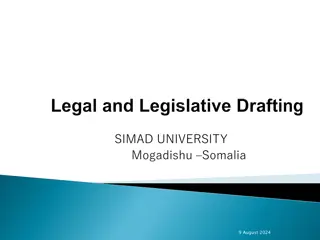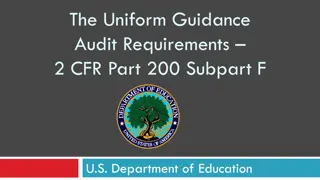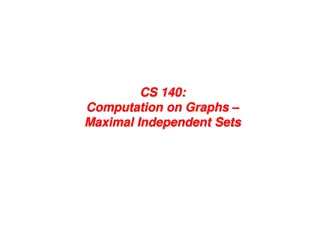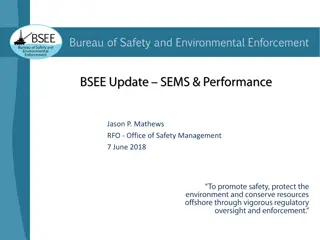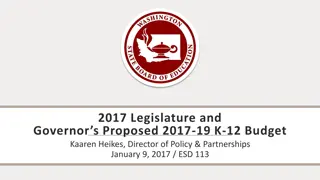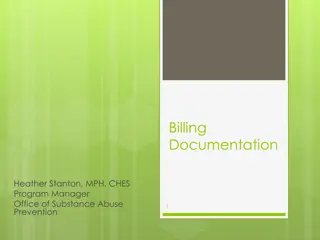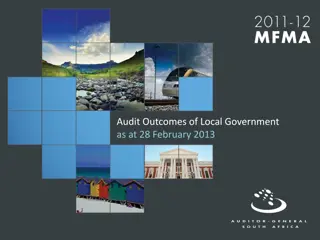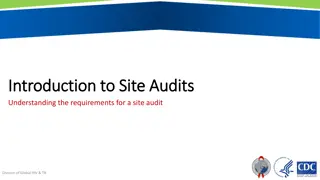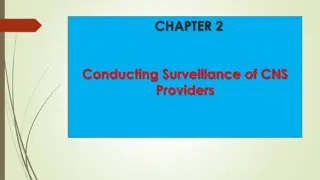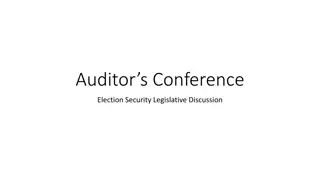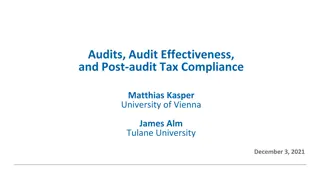Legislative Requirements for Independent System Audits in Local Government
National legislation mandates the establishment of a National Treasury to ensure transparency and expenditure control in all government spheres, including local government. This involves adherence to Generally Recognized Accounting Practice (GRAP OAG), uniform expenditure classifications, and treasury norms. System audits are conducted to assess municipal compliance with these regulations, and it is crucial to have audits performed by independent auditors to uphold integrity and accountability.
Download Presentation

Please find below an Image/Link to download the presentation.
The content on the website is provided AS IS for your information and personal use only. It may not be sold, licensed, or shared on other websites without obtaining consent from the author.If you encounter any issues during the download, it is possible that the publisher has removed the file from their server.
You are allowed to download the files provided on this website for personal or commercial use, subject to the condition that they are used lawfully. All files are the property of their respective owners.
The content on the website is provided AS IS for your information and personal use only. It may not be sold, licensed, or shared on other websites without obtaining consent from the author.
E N D
Presentation Transcript
REPORTING REFERENCE FORUM Item 9 Way forward: Independent system audits Presented by National Treasury: Chief Directorate Local Government Budget Analysis 04 October 2019
Legislative requirement for LG financial reforms Section 216(1) of the Constitution states that: National legislation must establish a National Treasury and prescribe measures to ensure both transparency and expenditure control in each sphere of government, by introducing - (a) Generally recognised accounting practice (GRAP OAG) (b) Uniform expenditure classifications (Standard Chart of Accounts / General Ledger) (c) Uniform treasury norms and standards (MFMA, Regulations, Circulars and Guidelines) Section 168 (1) of the MFMA further states that: The Minister (of Finance), acting with the concurrence of the Cabinet member responsible for local government, may make regulations for, among other things (a) any matter that may be prescribed and (b) any other matter that may facilitate the enforcement and administration of the Act mSCOA was regulated on 22 April 2014. All municipalities had to comply with the mSCOA Regulations by 01 July 2017, giving municipalities a 3 year preparation period. 2 2
Legislative requirement for system audits MFMA - General functions of National Treasury and provincial treasuries S5(1)(c): NT must enforce compliance with the measures established in terms of section 216 (1) of the Constitution and the MFMA Section 5(2)(d): NT may investigate any system of financial management and internal control in any municipality or municipal entity and recommend improvements mSCOA Regulations S14 (2): The accounting officer of a municipality and a municipal entity must ensure that its system providers cooperate with the National Treasury to provide access required by the National Treasury S14(3)(e): The National Treasury may use any of the information to fulfil any obligations in terms of legislation 3
Purpose of system audits To determine if the financial systems used by municipalities comply with the mSCOA regulations as per the detailed technical specifications in MFMA Circular No. 80 This information is required by: Parliament Municipalities CoGTA SALGA NTs audit committee Importantly: NTs audit committee resolved that these audits must be conducted by an independent auditor on the panel of the internal audit unit and not by NT officials CVs from individuals who are currently contracted to, employed by or associated with any of the municipal system providers in the market will not be considered The findings will inform whether a new transversal tender for the procurement of municipal financial management and internal control system solutions is required Cognisance will be taken that the category of municipality determines functionality requirements (see annexures for categories) 4
Draft scope of audit (1) Conduct functionality audits on all core municipal financial management to determine if: These systems: Provide for the hosting of the mSCOA structure and associated detail as contained in the 7 defined segments Accommodate and operate the classification framework across all 7 segments at a transactional level in the core financial management system (i.e. the transaction originates in the core financial system and not in any legacy system or manually outside of the core system) Provide for the data extraction functionality as per the segmented transactional string and upload to the local government portal and do not apply methodologies of data mapping to provide for the segmented transactional data string at a transactional level or manual intervention outside if the core system Comply with the 15 major business processes and technical requirements to ensure not only mSCOA compliancy, but also address the broader requirements of a system of financial management and internal control within a South African LG context (refer to Annexure) The 7 main business and process components integrate seamlessly with the mSCOA general ledger and comply at a posting level to the mSCOA Regulations and GRAP 5
Draft scope of audit (2) Comply with the fifteen major business processes and technical requirements to ensure not only mSCOA compliancy, but also address the broader requirements of a system of financial management and internal control within a South African local government context: (refer to MFMA Circular 80) The municipality has: ICT hardware, software and licences that is sufficient to run the chosen financial management and internal control systems solution Is utilising a core financial system solution that can accommodate its ICT connectivity needs A functional mSCOA Steering Committee consisting of representatives from all business unit, that meet regularly and report on their deliberations to EXCO and Council Appointed a suitably qualified System Administrator and the required IT securities and internal controls are in place The relevant municipal officials are sufficiently capacitated on all system modules and functionalities to use the financial management and internal control systems solution. Cognisance will be taken that the category of municipality determines functionality requirements 6
Methodology NT determine audit sites 1 System vendor demonstrate system functionality available 2 Functionality audit on the live core financial systems at municipalities System vendor will be consulted to clarify the preliminary findings if required System vendors may not be present during the audit process. Any consultation between the auditors and vendors may only be done in collaboration and in the presence of NT and/or respective PT and will be arranged by NT 3 4 NB: 7
THANK YOU For information on local government finances, please visit: https://municipalmoney.gov.za For additional information on national and provincial budgets, please visit our new budget data portal: https://vulekamali.gov.za
15 Major Business Processes in LG Corporate Governance Municipal Budgeting, Planning and Modelling Financial Accounting Costing and reporting Project Accounting Treasury and Cash Management Procurement Cycle: Supply Chain Management, Expenditure Management, Contract Management and Accounts Payable Grant Management Full Asset Life Cycle Management including Maintenance Management Real Estate and Resources Management Human Resource and Payroll Management Customer Care, Credit Control and Debt Collection Valuation Roll Management Land Use Building Control Revenue Cycle Billing. 10
7 main business and process components 1. General Ledger 2. Billing 3. Supply chain management 4. Assets management 5. Inventory and stores 6. Budgeting and planning 7. Human Resources and payroll 11
Categories of Municipalities Category A Metros Category B1 Secondary cities Category B2 Large towns Category B3 Small towns Category B4 Mostly rural Category C1 Districts without billing Category C Districts with billing 12
